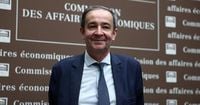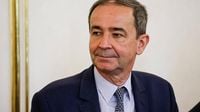On Monday, May 5, 2025, the board of directors of Électricité de France (EDF) officially approved the appointment of Bernard Fontana as the new CEO of the state-owned energy giant. This decision comes on the heels of Luc Rémont's abrupt departure from the position, which has sparked considerable discussion about the future direction of one of France's most critical energy providers.
The move was confirmed during a general meeting of EDF shareholders, where Fontana's appointment received unanimous support. Following the approval by the board, a presidential decree is expected to finalize Fontana's appointment, which is anticipated to be issued by Wednesday, May 7, 2025.
Fontana, who previously served as the CEO of Framatome, a nuclear boiler maker, expressed his commitment to the role in an email sent to EDF employees. "I approach this new responsibility at EDF with humility, attentiveness, and commitment," he wrote, signaling his readiness to tackle the challenges ahead.
At 64 years of age, Fontana's term is set for four years, concluding at the end of the general assembly scheduled for December 31, 2028. His appointment comes at a time when EDF is facing significant challenges, including a series of disputes with the French state regarding the management of the EPR2 reactor construction program and the pricing of electricity for industrial customers.
During his confirmation hearings, Fontana outlined a clear roadmap for his leadership, emphasizing six key priorities aimed at strengthening the performance of EDF's nuclear fleet, enhancing financial sustainability, and ensuring competitive electricity pricing for industrial consumers.
The first priority is to increase the availability of the French nuclear fleet to reach 400 terawatt-hours (TWh) by 2030, a notable increase from the 361.7 TWh produced in 2024. To achieve this, Fontana plans to reduce maintenance downtime and optimize intervention planning. "I love the industry," he stated during his parliamentary hearings, underscoring his dedication to revitalizing the nuclear sector.
Another critical focus is the finalization of contracts for the allocation of nuclear production, which are essential for stabilizing electricity prices for large industrial consumers. With his extensive experience in the nuclear sector, Fontana is well-positioned to navigate these negotiations.
Fontana also faces the task of managing the costs and timelines associated with the EPR2 program. EDF is required to provide a detailed estimate and schedule for the construction of six new EPR2 reactors by the end of 2025, with a final investment decision expected by mid-2026 to ensure commissioning before the end of 2038.
In addition to nuclear energy, Fontana plans to reinvigorate investments in hydroelectric power, which have stalled for nearly 15 years. He insists that any investments must protect EDF's historical concessions and avoid competitive bidding, which he views as a red line.
Furthermore, Fontana is committed to advancing offshore wind projects, which EDF is already engaged in through various awarded tenders. He acknowledges that the pace of renewable energy development is contingent upon government action.
Financially, EDF has begun to regain its footing, reporting a net income of 11.4 billion euros in 2024. The company is also set to distribute 2 billion euros in dividends to the French state, a move that reflects its improving financial health.
Fontana's emphasis on maintaining a debt ratio of less than 2.5 times EBITDA is a clear indication of his commitment to financial prudence, especially as EDF looks to invest in new nuclear initiatives.
The board of directors expressed gratitude to Luc Rémont for his contributions to the recovery of nuclear production and the overall financial situation of EDF during his tenure. His departure, however, has left a considerable void that Fontana is now tasked with filling.
As the new CEO prepares to take the reins, the energy landscape in France is evolving rapidly. With the pressing need for low-carbon electricity amidst climate change concerns, Fontana's leadership will be pivotal in steering EDF through these turbulent waters.
In summary, Bernard Fontana's appointment as CEO of EDF marks a significant turning point for the company as it seeks to solidify its position in the nuclear energy sector while navigating complex regulatory and financial challenges. His commitment to revitalizing the nuclear fleet and ensuring competitive electricity pricing will be closely watched by stakeholders across the industry.


